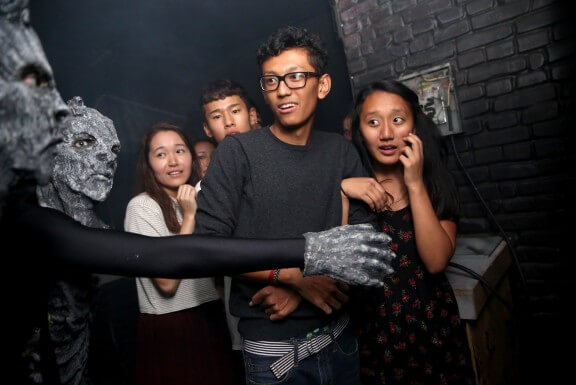 The latest from filmmaker Claire Denis is the grim “Bastards.”
The latest from filmmaker Claire Denis is the grim “Bastards.”
Credit: Getty Images
The French filmmaker Claire Denis has arguably never made a film as dark as “Bastards.” Even “Trouble Every Day,” which shocked the 2001 Cannes Film Festival with its bloody depiction of lustful, hungry vampires, wasn’t as grim as this drama, which looks at the wake of a sexual assault that drives a ship captain (Vincent Lindon) to an obscure attempt at vengeance. But Denis — who’s also made films that were romantic (“Friday Night”), lovely (“35 Shots of Rum”) and sensual (“Beau Travail”) — insists it’s not that dark, nor against the rich, even if she was in a bad mood when she made it.
“Trouble Every Day” was recently given a restoration. That was once quite controversial, and now it’s understood as one of your best works. What do you think of that film now?
When films are finished I don’t watch them. I don’t forget them. I know them by heart. But to watch them — I don’t know, I don’t need it. Sometimes for other people they will change. But for me, they’re gone. To be able to make the next film is more important. It’s good to be empty, to be not carrying them on my back, like a cross. But the Tindersticks song at the beginning [of “Trouble Every Day”] is one of my favorite songs. They were so well into the film with me. We were floating in the same river doing that film.
How did you describe “Bastards” to them when you asked them to do the score?
There was no possible description. I told him I’m going to write a script that’s maybe more angry than others. Then [lead singer Stuart Staples]read the synopsis. The shock for him was when he saw the first image of the dailies while I was shooting. I remember him leaning over in pain. I asked him what was wrong. He said, “Oh my god, that’s painful.” I was not completely aware it was so painful. But he as the first one to tell me that it hurt.
Did you have any instructions for him?
I told him we would need a very inhuman music. I said I was listening to Tangerine Dream.
He and Tindersticks have done the scores to several of your films. At this point is it just instinctual?
Since the very beginning I’ve trusted him. And I know he won’t lie to me. I know if he doesn’t like something he will tell me. And he’s the only person that I believe completely. It’s funny to say that. He’s such a complete stranger in a way — this guy from Nottingham, England. Yet I’m happy when he’s happy with the music.
You said in a press conference for “Bastards” something about being in a sinister mood.
No, no, I said I was a sinister person. But I change from film to film. When I did “35 Shots of Rum” I was in the mood for love, for my grandfather. I am a really sinister person, I guess. When I did this film I was really angry. I was disgusted by many things.
It seems to be very critical of the rich.
I’m not criticizing. I don’t judge the rich. I don’t like to judge people. I can be angry, I can be nervous, I can be bad-tempered. I’m very bad-tempered often. But to judge people, for me, it’s very hard, I must say. Impossible. I don’t think I ever wrote a script whose character that I hate completely. There is always something I like in any character in a film I’ve made.
This is the first film that you and cinematographer Agnes Godard have made in digital. What was it like making the switch?
The difficult thing was to test it before, then forget that it’s not a camera but a computer. I remember when I was shooting “Beau Travail” [in Djibouti] the light was so strong I thought I could feel it was burning the film. When it’s that hot a digital camera stops working. You have to put ice bags on it. Computers can’t stand the heat.
How else did it change your approach?
With the night scenes, we wanted to get scenes that were obscure and dark. That is difficult with digital. And I wanted to be sure of what we shot every day, because I didn’t want to go to the editing room with an image that was like a blueprint of the image and nothing more. I hate when people say, “After you finish editing you will know what the look will be.” No, the look of the film should be there when you’re shooting.

















